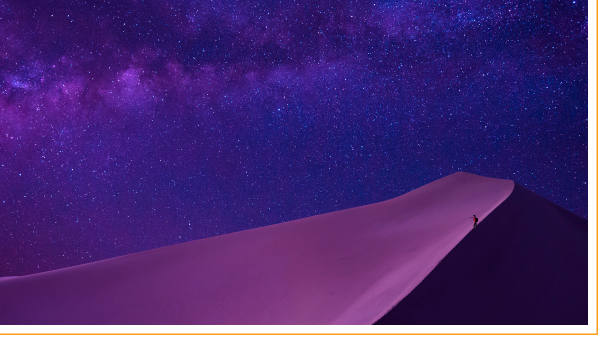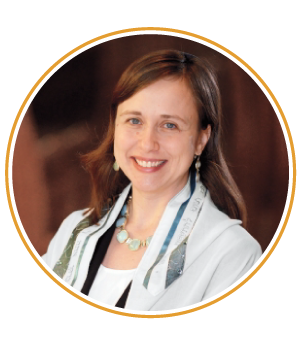 In their earliest months as a free people, the Israelites are wandering a vast, unmarked wilderness that is both physical and metaphorical. It is disorienting to be released into the vastness of a midbar from the constriction of Mitzrayim (“the narrows”). Moses’ presence soothes and comforts the people, and as their leader and intermediary between them and the divine, he represents a kind of certainty for them even when they are uprooted and wandering, in between the generations of slavery and the promised land. (Exodus 32:1): “And when the people saw that Moses delayed to come down from the mount, the people gathered themselves together unto Aaron, and said unto him: ‘Up, make us a god who shall go before us; for as for this Moses, the man that brought us up out of the land of Egypt, we know not what is become of him.’” However, if we look closely at the commandments regarding the construction of the Mishkan – a “dwelling place for God,” and the motivation for and process of the construction of the golden calf, we can glean rich insight into the nature of the newly-forged covenantal relationship between God and B’nai Yisrael.
In their earliest months as a free people, the Israelites are wandering a vast, unmarked wilderness that is both physical and metaphorical. It is disorienting to be released into the vastness of a midbar from the constriction of Mitzrayim (“the narrows”). Moses’ presence soothes and comforts the people, and as their leader and intermediary between them and the divine, he represents a kind of certainty for them even when they are uprooted and wandering, in between the generations of slavery and the promised land. (Exodus 32:1): “And when the people saw that Moses delayed to come down from the mount, the people gathered themselves together unto Aaron, and said unto him: ‘Up, make us a god who shall go before us; for as for this Moses, the man that brought us up out of the land of Egypt, we know not what is become of him.’” However, if we look closely at the commandments regarding the construction of the Mishkan – a “dwelling place for God,” and the motivation for and process of the construction of the golden calf, we can glean rich insight into the nature of the newly-forged covenantal relationship between God and B’nai Yisrael.
Witnessing the presence of God – connecting with the divine – will now, in this covenant of mutual need and mutual responsibility, require human action. Every individual will need to offer up their unique gifts to the ongoing project of sustaining community, and it is in the relationships between us – in community itself, that God will dwell. The Mishkan has walls but has empty space inside of it – a place for us. It dwells within us (Va’asu li mikdash ve’shachanti betocham) and we must constantly create it/allow it to travel with us, by our efforts to nurture community, based in the generous heart and offering of full presence of every individual.
Exodus 25:1-9: (1) And the LORD spoke unto Moses, saying: (2) ’Speak unto the children of Israel, that they take for Me an offering; of every man whose heart maketh him willing ye shall take My offering. (3) And this is the offering which ye shall take of them: gold, and silver, and brass; (4) and blue, and purple, and scarlet, and fine linen, and goats’ hair; (5) and ram skins dyed red, and sealskins, and acacia-wood; (6) oil for the light, spices for the anointing oil, and for the sweet incense; (7) onyx stones, and stones to be set, for the ephod, and for the breastplate. (8) And let them make Me a sanctuary, that I may dwell among them.”
The Mishkan is to be constructed mindfully, while by contrast, the golden calf is hurriedly formed out of, one can imagine, golden earrings practically ripped out of the people’s ears; the people are scared, they feel alone – without Moses or a tangible sign of God to accompany them. The golden calf is solid, made of one material, representing a seeming certainty and stability; paradoxically, it is the Mishkan, built of varied materials — the gifts that each individual can uniquely give, given with a generous heart, and with space inside of it, where the divine will dwell.
The Israelites are only in their infancy as a free people, and the vastness of the midbar is frightening. Though the covenant with God was forged at Sinai, they assented before they knew how to do what will be required of them (“Na’aseh veh nishmah! (We will do it – and (then) we will hear/understand). The incident of the golden calf demonstrates that they are far from the people they are to become – but through the practice of building and maintaining the portable dwelling place for God, they will evolve into a people which can find God in the empty space– in the in-between. God is to be found in between people (in relationship – and relationship requires separation, empty space between the partners in relationship), in the space we fill with our voices joined in song and prayer; the God of Israel will be a presence found not in the solidity of certainty, but in the ongoing questioning, insecurity, in tears of despair and the persistent, stubborn hope for a better future and a commitment to build that future, that will define the Jewish people for all time.
In their desire for certainty in an uncertain world, the people say to Aaron: “Aseh lanu elohim” (Exodus 32:1) “Come, make for us a god who shall go before us.” They want a God who is as solid and tangible as gold, and a God who can be constructed for them. But the God with whom they have entered into this eternal covenant is one who commands the ongoing work of relationship, each person with their own responsibility to offer what they can. “Va’asu li mikdash ve’shachanti b’tocham,” God commands them. “Make (all of you! Each of you!) a place for Me, so that I may dwell among them (or, within them).”
We cannot construct a god – we can only construct a place for God to dwell, because the God of Israel is found only in the space we create, through the way we live our lives and open our hearts and our hands to one another. The God of Israel is found in the space between us, and in the ongoing task of reaching out across it. It isn’t simple. It isn’t easy. But this theology of mishkan rather than egel zahav – uncertainty and spaciousness rather than certainty and solidity – is our sacred inheritance.


Witnessing the presence of God – connecting with the divine – will now, in this covenant of mutual need and mutual responsibility, require human action. Every individual will need to offer up their unique gifts to the ongoing project of sustaining community, and it is in the relationships between us – in community itself, that God will dwell. The Mishkan has walls but has empty space inside of it – a place for us. It dwells within us (Va’asu li mikdash ve’shachanti betocham) and we must constantly create it/allow it to travel with us, by our efforts to nurture community, based in the generous heart and offering of full presence of every individual.
Exodus 25:1-9: (1) And the LORD spoke unto Moses, saying: (2) ’Speak unto the children of Israel, that they take for Me an offering; of every man whose heart maketh him willing ye shall take My offering. (3) And this is the offering which ye shall take of them: gold, and silver, and brass; (4) and blue, and purple, and scarlet, and fine linen, and goats’ hair; (5) and ram skins dyed red, and sealskins, and acacia-wood; (6) oil for the light, spices for the anointing oil, and for the sweet incense; (7) onyx stones, and stones to be set, for the ephod, and for the breastplate. (8) And let them make Me a sanctuary, that I may dwell among them.”
The Mishkan is to be constructed mindfully, while by contrast, the golden calf is hurriedly formed out of, one can imagine, golden earrings practically ripped out of the people’s ears; the people are scared, they feel alone – without Moses or a tangible sign of God to accompany them. The golden calf is solid, made of one material, representing a seeming certainty and stability; paradoxically, it is the Mishkan, built of varied materials — the gifts that each individual can uniquely give, given with a generous heart, and with space inside of it, where the divine will dwell.
The Israelites are only in their infancy as a free people, and the vastness of the midbar is frightening. Though the covenant with God was forged at Sinai, they assented before they knew how to do what will be required of them (“Na’aseh veh nishmah! (We will do it – and (then) we will hear/understand). The incident of the golden calf demonstrates that they are far from the people they are to become – but through the practice of building and maintaining the portable dwelling place for God, they will evolve into a people which can find God in the empty space– in the in-between. God is to be found in between people (in relationship – and relationship requires separation, empty space between the partners in relationship), in the space we fill with our voices joined in song and prayer; the God of Israel will be a presence found not in the solidity of certainty, but in the ongoing questioning, insecurity, in tears of despair and the persistent, stubborn hope for a better future and a commitment to build that future, that will define the Jewish people for all time.
In their desire for certainty in an uncertain world, the people say to Aaron: “Aseh lanu elohim” (Exodus 32:1) “Come, make for us a god who shall go before us.” They want a God who is as solid and tangible as gold, and a God who can be constructed for them. But the God with whom they have entered into this eternal covenant is one who commands the ongoing work of relationship, each person with their own responsibility to offer what they can. “Va’asu li mikdash ve’shachanti b’tocham,” God commands them. “Make (all of you! Each of you!) a place for Me, so that I may dwell among them (or, within them).”
We cannot construct a god – we can only construct a place for God to dwell, because the God of Israel is found only in the space we create, through the way we live our lives and open our hearts and our hands to one another. The God of Israel is found in the space between us, and in the ongoing task of reaching out across it. It isn’t simple. It isn’t easy. But this theology of mishkan rather than egel zahav – uncertainty and spaciousness rather than certainty and solidity – is our sacred inheritance.